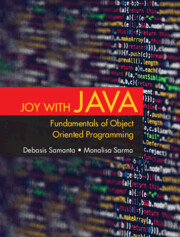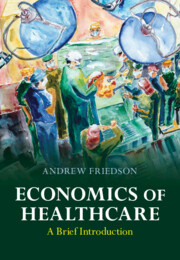Refine search
Actions for selected content:
36846 results in Cambridge Textbooks
Copyright page
-
- Book:
- A Primer in Christian Ethics
- Published online:
- 26 October 2023
- Print publication:
- 09 November 2023, pp iv-iv
-
- Chapter
- Export citation
Figures
-
- Book:
- Formal Models of Crisis Bargaining
- Published online:
- 30 November 2023
- Print publication:
- 09 November 2023, pp viii-x
-
- Chapter
- Export citation
5 - Listening to Cries for Liberation
- from Part I - Describing Well
-
- Book:
- A Primer in Christian Ethics
- Published online:
- 26 October 2023
- Print publication:
- 09 November 2023, pp 91-110
-
- Chapter
- Export citation

Joy with Java
- Fundamentals of Object Oriented Programming
-
- Published online:
- 08 November 2023
- Print publication:
- 15 June 2023
-
- Textbook
- Export citation

Economics of Healthcare
- A Brief Introduction
-
- Published online:
- 02 November 2023
- Print publication:
- 23 November 2023
-
- Textbook
- Export citation
Endmatter
-
- Book:
- Introduction to Electrodynamics
- Published online:
- 06 October 2023
- Print publication:
- 02 November 2023, pp 603-606
-
- Chapter
- Export citation
8 - The President and the Making of Foreign Policy
- from Part II - The Process of Policy Making
-
- Book:
- American Foreign Policy and Process
- Published online:
- 19 October 2023
- Print publication:
- 02 November 2023, pp 327-378
-
- Chapter
- Export citation
Dedication
-
- Book:
- American Foreign Policy and Process
- Published online:
- 19 October 2023
- Print publication:
- 02 November 2023, pp v-vi
-
- Chapter
- Export citation
Tables
-
- Book:
- American Foreign Policy and Process
- Published online:
- 19 October 2023
- Print publication:
- 02 November 2023, pp xvi-xvi
-
- Chapter
- Export citation
Maps
-
- Book:
- American Foreign Policy and Process
- Published online:
- 19 October 2023
- Print publication:
- 02 November 2023, pp xv-xv
-
- Chapter
- Export citation
14 - American Foreign Policy Values and the Future
- from Part III - Conclusion
-
- Book:
- American Foreign Policy and Process
- Published online:
- 19 October 2023
- Print publication:
- 02 November 2023, pp 657-676
-
- Chapter
- Export citation
16 - Domestic Courts and Their Relationship with International Law
- from Part III - The Surroundings of International Law
-
- Book:
- International Law
- Published online:
- 19 October 2023
- Print publication:
- 02 November 2023, pp 317-334
-
- Chapter
- Export citation
3 - Potentials
-
- Book:
- Introduction to Electrodynamics
- Published online:
- 06 October 2023
- Print publication:
- 02 November 2023, pp 113-165
-
- Chapter
- Export citation
3 - After the Missile Crisis and the Vietnam War
- from Part I - Values and Policies in American Foreign Affairs
-
- Book:
- American Foreign Policy and Process
- Published online:
- 19 October 2023
- Print publication:
- 02 November 2023, pp 80-122
-
- Chapter
- Export citation
Copyright page
-
- Book:
- Introduction to Electrodynamics
- Published online:
- 06 October 2023
- Print publication:
- 02 November 2023, pp iv-iv
-
- Chapter
- Export citation
2 - Electrostatics
-
- Book:
- Introduction to Electrodynamics
- Published online:
- 06 October 2023
- Print publication:
- 02 November 2023, pp 57-112
-
- Chapter
- Export citation
Advertisement
-
- Book:
- Introduction to Electrodynamics
- Published online:
- 06 October 2023
- Print publication:
- 02 November 2023, pp xiv-xx
-
- Chapter
- Export citation
7 - A Foreign Policy of Restoration?
- from Part I - Values and Policies in American Foreign Affairs
-
- Book:
- American Foreign Policy and Process
- Published online:
- 19 October 2023
- Print publication:
- 02 November 2023, pp 287-324
-
- Chapter
- Export citation
Index
-
- Book:
- International Law
- Published online:
- 19 October 2023
- Print publication:
- 02 November 2023, pp 351-374
-
- Chapter
- Export citation
8 - International Courts and Tribunals
- from Part I - The Structure of International Law
-
- Book:
- International Law
- Published online:
- 19 October 2023
- Print publication:
- 02 November 2023, pp 153-179
-
- Chapter
- Export citation
